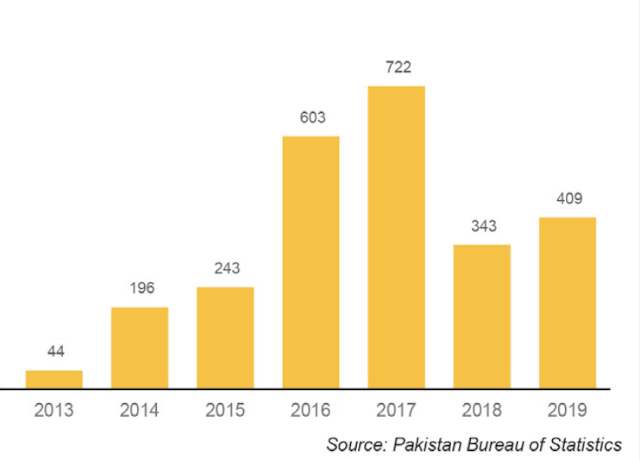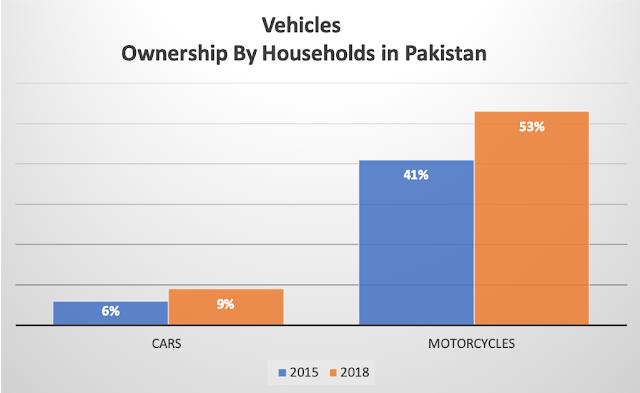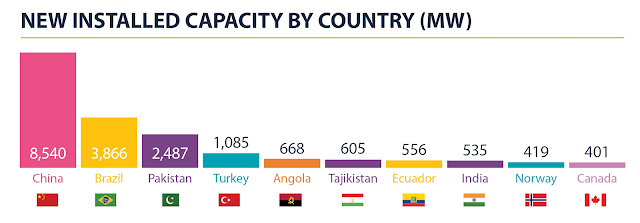PakAlumni Worldwide: The Global Social Network
The Global Social Network
Renewable Energy in Pakistan: 15.2% of Households Use Solar
Solar panel installations in Pakistani homes are rising rapidly. Pakistan PSLM/HIES 2018-19 survey results reveal that 15.2% of all households are using solar panels as a source of energy for their homes. Khyber-Pakhtunkhwa province leads the nation with 40% of all households using solar energy. Rural Pakistan is embracing solar power at a faster rate than Urban Pakistan. Adoption of solar in rural areas of KP is at 43%, Sindh 33.9%, Balochistan 20.4% and Punjab 7.9%. Rapid decline in cost of solar panels appears to be driving the adoption of solar in Pakistan's rural areas where grid power is either unavailable or unreliable. Pakistan is starting to join the clean energy revolution with increasing adoption of solar and recent announcement of National Electric Vehicle Policy. Covid19 pandemic may temporarily slow it down but the upward trend will likely continue.
Pakistan Solar Panel Imports in Millions of US Dollars. Source: FBS... |
Solar Panels in Pakistan:
Imports of solar panels have increased at 15.9% annually in US dollar terms and 22.6% in Pakistan rupee terms in the last years. Solar panel imports have jumped from just $1 million in 2004 to a peak of $772 million in the fiscal year ending June 30, 2017, then declined to $343 million in 2018 and then rose again to $409 million in 2019. Covid19 pandemic may temporarily slow it down but the upward trend will likely continue.
Households Using Solar Panels. Source: PSLM/HIES 2018-19 Via Bilal ... |
Solar panel installations in Pakistani homes are rising rapidly. Pakistan PSLM/HIES 2018-19 survey results reveal that 15.2% of all households are using solar panels as source of energy for their homes.
Government survey data shows that 20% of rural households are using solar panels, significantly ahead of just 7.7% urban households in the country. Khyber-Pakhtunkhwa province leads with 40% of households using solar energy, followed by Balochistan 25.7%, Sindh 20.5% and Punjab 6.4%.
Rural Pakistan is leading the nation into wider use of solar power. Adoption of solar in rural areas of KP is at 43%, Sindh 33.9%, Balochistan 20.4% and Punjab 7.9%. Rapid decline in cost of solar panels appears to be driving adoption of the solar energy in Pakistan's rural areas where grid power is either unavailable or unreliable.
Pakistan Electric Vehicle Policy:
Pakistan has a low level of motorization with just 9% of the households owning a car. Nearly half of all households own a motorcycle. Motorization rates in the country have tripled over the last decade and a half, resulting in nearly 40% of all emissions coming from vehicles. Concerns about climate change and environmental pollution have forced the government to to take a number of actions ranging from adoption of Euro6 emission standards for new vehicles with internal combustion engines (ICE) since 2015 and announcement of a national electric vehicle (EV) policy this year.
Private vehicle ownership in Pakistan has risen sharply over the last 4 years. More than 9% of households now own cars, up from 6% in 2015. Motorcycle ownership has jumped from 41% of households in 2015 to 53% now, according to data released by Federal Bureau of Statistics (FBS) recently. There are 32.2 million households in Pakistan, according to 2017 Census.
Pakistan's National EV Policy is a forward looking step needed to deal with climate concerns from growing transport sector emissions with rapidly rising vehicle ownership. It offers tax incentives for buyers and sellers. It also focuses on development of nationwide charging infrastructure to ease adoption of electric vehicles.
Low Carbon Energy Growth:
In recent years, Pakistan government has introduced a number of supportive policies, including feed-in tariffs and a net metering program to incentivize renewables. These have been fairly successful, and renewables capacity in the country surged substantially over 2018 when 1245 MW was added, of which 826MW was contributed by the solar sector, according to Fitch Solutions.
Pakistan’s Alternative Energy Development Board (AEDB) recently signed deals for projects that will see the country expand its wind power capacity by 560 MW. Fitch Solutions forecasts Pakistan's solar capacity to grow by an annual average of 9.4% between 2019-2028, taking total capacity over 3.8GW by the end of our forecast period.
Sindh government has recently signed a deal for 400MW solar park at Manjhand, 20MW rooftop solar systems on public sector buildings in Karachi and Hyderabad, and 200,000 solar home systems for remote areas in 10 districts of the province. The project is estimated to cost USD105million, with the World Bank funding USD100 million.
The biggest and most important source of low-carbon energy in Pakistan is its hydroelectric power plants. Pakistan ranked third in the world by adding nearly 2,500 MW of hydropower in 2018, according to Hydropower Status Report 2019. China added the most capacity with the installation of 8,540 megawatts, followed by Brazil (3,866 MW), Pakistan (2,487 MW), Turkey (1,085 MW), Angola (668 MW), Tajikistan (605 MW), Ecuador (556 MW), India (535 MW), Norway (419 MW) and Canada (401 MW).
New Installed Hydroelectric Power Capacity in 2018. Source: Hydrowo... |
Hydropower now makes up about 28% of the total installed capacity of 33,836 MW as of February, 2019. WAPDA reports contributing 25.63 billion units of hydroelectricity to the national grid during the year, “despite the fact that water flows in 2018 remained historically low.” This contribution “greatly helped the country in meeting electricity needs and lowering the electricity tariff for the consumers.”
Chinese BYD in Pakistan:
Multiple media reports suggest that China's BYD is about to enter Pakistan market following the announcement of Pakistan National EV Policy. These reports indicate that Toyota, one of the largest automakers in Pakistan, has signed a deal with BYD to manufacture electric vehicles.
Other reports indicate that Pakistan's Rahmat Group is in talks with BYD to set up an electric vehicle plant at Nooriabad in Sindh province.
Minister for Science and Technology Fawad Chaudhry has claimed that in three years Pakistan will become the first country to manufacture electric buses, which will be driven by an electric motor and obtains energy from on-board batteries.
Summary:
Pakistan is starting to join the clean energy revolution with increasing adoption of solar and recent announcement of National Electric Vehicle Policy. Solar panel installations in Pakistani homes are rising rapidly. Pakistan PSLM/HIES 2018-19 survey results reveal that 15.2% of all households are using solar panels as source of energy for their homes. The country has set targets for renewable energy growth and announced National Electric Vehicle Policy. In recent years, Pakistan government has introduced a number of supportive policies, including feed-in tariffs and a net metering program to incentivize renewables. These have been fairly successful, and renewables capacity in the country surged substantially over 2018 when 1245 MW was added, of which 826MW was contributed by the solar sector, according to Fitch Solutions. High-capacity battery pack costs have dropped nearly 40% since 2015, according to Wood Mackenzie data as reported by Wall Street Journal. Cost reductions are expected to continue to only $8 to $14 per MW-hour by 2020, or about a penny per kW-hour. While production and use of renewable energy are growing, the electric vehicles in Pakistan have yet to find traction. Hopefully, the National EV policy will encourage production and adoption of electric vehicles in the country. Covid19 pandemic may temporarily slow it down but the upward trend will likely continue.
Related Links:
Clean Energy Revolution in Pakistan
Pakistan Electric Vehicle Policy
Recurring Cycles of Drought and Floods in Pakistan
Pakistan's Response to Climate Change
Massive Oil and Gas Discovery in Pakistan: Hype vs Reality
Digital BRI: China and Pakistan Building Fiber, 5G Networks
Growing Water Scarcity in Pakistan
China-Pakistan Economic Corridor
Ownership of Appliances and Vehicles in Pakistan
-
Comment by Riaz Haq on July 21, 2023 at 4:37pm
-
LONGi and Nimir Energy Forge Strategic Partnership to Advance Solar Energy Solutions in Pakistan
https://solarquarter.com/2023/07/20/longi-and-nimir-energy-forge-st...
LONGi and Nimir Energy announced the signing of a Memorandum of Understanding (MOU) aimed at fostering collaboration in the development and deployment of solar energy solutions. This strategic partnership marks a significant milestone in the pursuit of sustainable and clean energy sources to meet Pakistan’s growing energy demand.
Under the terms of the MOU, Nimir Energy and LONGi will work together to explore opportunities and synergies in solar energy projects and capacity-building initiatives. The collaboration will leverage Nimir Energy’s expertise in project development and LONGi’s cutting-edge solar technology to drive the adoption of renewable energy in pan-Pakistan, pushing the government’s intent to promote solar.
Nimir Energy is part of Nimir Group, providing services in renewable energy with a primary focus on solar EPC for industrial, commercial and residential users. Nimir Group has been serving Pakistan and its business community since 1964 with a diversified range of products.
With climate action in full swing, Nimir would like to play a positive role in bringing in the right resources to ensure Pakistan’s transition to clean and sustainable energy. The company’s commitment to sustainable development aligns perfectly with LONGi’s vision to enable the world to transition to a low-carbon future through its industry-leading solar products and solutions.
LONGi, renowned for its high-efficiency solar modules and advanced photovoltaic technology, has emerged as a global leader in the solar industry. By joining forces with Nimir Energy, the company aims to expand its reach and accelerate the development of solar energy projects in key markets around the world.
“We are delighted to enter into this strategic partnership with LONGi, a company that shares our commitment to advancing renewable energy solutions,” said Waqas Ahmed Rana, COO of Nimir Energy. “Through this collaboration, we will combine our strengths and resources to drive innovation and promote the widespread adoption of solar energy, contributing to a more sustainable future.”
“LONGi is excited to join forces with Nimir Energy, a respected player in the renewable energy sector,” stated Ali Majid, Country head, Sales of LONGi. “Together, we can unlock new opportunities and create lasting impact by accelerating the deployment of solar energy projects worldwide. This collaboration exemplifies our dedication to addressing the challenges of climate change through technology innovation and sustainable business practices.”
With 90 terawatt-hours of total energy needed, Pakistan ranks among the top countries with huge potential for solar energy. Rising electricity prices and instability in the grid have added further to the woes of the average Pakistani consumer. LONGi envisions solving this problem by providing a cost-effective and high-quality solution to the public at large. As the biggest panel manufacturer in the world, LONGi plans to cater to all kinds of consumers with a focus on industrial users to provide services unparalleled in the market.
-
Comment by Riaz Haq on August 18, 2023 at 7:41am
-
Kuwait’s EnerTech Holding Explores Renewable Energy Cooperation With Pakistan’s K-Electric
https://solarquarter.com/2023/08/14/kuwaits-enertech-holding-explor...
Kuwait-based energy firm EnerTech Holding is actively exploring collaboration and investment prospects with Pakistan’s K-Electric power supply company.
The objective is to expedite Pakistan’s shift to renewable energy sources, according to a joint statement released by the two entities this week. Pakistan’s energy imports, accounting for 30.7% of total imports, reached $17 billion during the previous fiscal year (2022-23).
To curtail its dependency on imported fossil fuels and conserve foreign currency, Pakistan aims to raise the proportion of clean energy in its energy mix to 60% by 2030, a considerable increase from the current 4% attributed to renewable sources.
Abdallah Al-Mutairi, the CEO of EnerTech Holding, expressed enthusiasm about K-Electric’s ambitions in line with Pakistan’s renewable energy vision. He stressed the potential of collaboration between EnerTech’s expertise and K-Electric’s legacy in driving substantial progress towards these goals.
K-Electric envisions catering to around five million customers with an electricity demand of 5,000 megawatts (MW) by 2030. The company aims to meet up to 30% of this demand through renewable energy, reducing reliance on imported fuels for electricity generation and benefiting the national economy.
Moonis Alvi, the head of K-Electric, highlighted the opportunity to work closely with global entities like EnerTech, possessing an established international presence and investment portfolio. This collaboration can facilitate the adoption of best practices, thus enhancing energy delivery to customers while promoting a greener and more sustainable future.
EnerTech Holding, a subsidiary of the National Technology Enterprises Company (NTEC) and an extension of the Kuwait Investment Authority, spans across 65 countries. Its collaboration with K-Electric aligns with both entities’ dedication to advancing sustainable energy solutions.
-
Comment by Riaz Haq on August 28, 2023 at 10:18pm
-
Haier revolutionizes cooling solutions with launch of Pakistan's first Solar Hybrid Air Conditioner
https://en.dailypakistan.com.pk/28-Aug-2023/haier-revolutionizes-co...
Haier is proud to unveil an unprecedented leap in the realm of cooling solutions with the introduction of Pakistan's very first solar hybrid air conditioner. This groundbreaking innovation marks a monumental shift towards sustainable and energy-efficient living, setting new standards in the industry. The launch of the solar hybrid air conditioner underscores Haier's dedication to shaping a brighter future for generations to come.
The Haier solar hybrid air conditioner is a groundbreaking marvel that operates entirely on solar power during daylight hours, eliminating the need for any intermediary devices such as inverters, batteries, UPS, or converters. By seamlessly integrating four 540W solar panels and establishing a direct connection to the outdoor unit, the AC functions autonomously, setting an industry precedent. This marks a historic milestone in Pakistan, where an air conditioner operates directly on solar power without any supplementary support.
For the very first time, consumers can embrace cooling technology that not only cools their spaces but also ensures zero electricity bills during daylight hours. Never before in Pakistan has an air conditioner operated directly on solar power without any intermediate support. This innovative approach significantly minimizes the concerns related to electricity costs and additional equipment expenses. As daylight graces the solar panels, the AC operates exclusively on solar energy, providing cooling comfort without the burden of utility bills. The system seamlessly switches to the grid only in case of cloudy weather, mimicking the hybrid concept found in modern-day hybrid cars. Additionally, the same holds true for nighttime operations.
Comment
- ‹ Previous
- 1
- …
- 3
- 4
- 5
- Next ›
Twitter Feed
Live Traffic Feed
Sponsored Links
South Asia Investor Review
Investor Information Blog
Haq's Musings
Riaz Haq's Current Affairs Blog
Please Bookmark This Page!
Blog Posts
Pakistani Student Enrollment in US Universities Hits All Time High
Pakistani student enrollment in America's institutions of higher learning rose 16% last year, outpacing the record 12% growth in the number of international students hosted by the country. This puts Pakistan among eight sources in the top 20 countries with the largest increases in US enrollment. India saw the biggest increase at 35%, followed by Ghana 32%, Bangladesh and…
ContinuePosted by Riaz Haq on April 1, 2024 at 5:00pm
Agriculture, Caste, Religion and Happiness in South Asia
Pakistan's agriculture sector GDP grew at a rate of 5.2% in the October-December 2023 quarter, according to the government figures. This is a rare bright spot in the overall national economy that showed just 1% growth during the quarter. Strong performance of the farm sector gives the much needed boost for about …
ContinuePosted by Riaz Haq on March 29, 2024 at 8:00pm
© 2024 Created by Riaz Haq.
Powered by
![]()





You need to be a member of PakAlumni Worldwide: The Global Social Network to add comments!
Join PakAlumni Worldwide: The Global Social Network